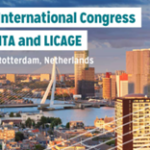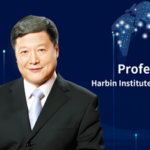Editor’s Note:
From June 17th to 23rd, 2023, the 17th International Conference on Malignant Lymphoma (ICML) was held grandly in Lugano, Switzerland. As the world’s largest conference on malignant lymphoma, ICML has become an essential event in the field of lymphoma research and treatment over the past decades, aiming to present and discuss the latest basic, translational, and clinical research on lymphoma. NK/T cell lymphoma is a relatively rare hematological malignancy with no standardized treatment regimen. At this conference, Dr. Huiqiang Huang from the Cancer Center of Sun Yat-sen University,China, gave an enlightening lecture on the treatment strategy for NK/T cell lymphoma. Oncology Frontier has specially interviewed Professor Huang and compiled the contents as follows:
01
Oncology Frontier: Could you discuss the traditional chemotherapy for NK/T cell lymphoma?
Dr. Huang: The traditional chemotherapy regimen containing L-asparaginase (L-Asp) is still the cornerstone of NK/T cell lymphoma treatment, such as the SMILE regimen, P-Gemox without high-dose methotrexate (MTX), and the DDGP regimen, all of which have shown good therapeutic effects in the treatment of NK/T cell lymphoma. However, in terms of regimen selection, when the therapeutic effects are similar, we tend to recommend choosing the one with relatively less toxicity, usually preferring chemotherapy without high-dose MTX. However, it’s worth noting that for patients with advanced NK/T cell lymphoma, even with chemotherapy combined with autologous transplantation, the overall therapeutic effect is still not satisfactory. Approximately 50% of patients eventually relapse. This is a pressing issue we need to address. Solely relying on chemotherapy is difficult to further improve the therapeutic effect; we need to find more effective new treatment regimens.
02
Oncology Frontier: Can you discuss the application of PD-1 monoclonal antibody and histone deacetylase inhibitor (HDACi) in the treatment of relapsed/refractory NK/T cell lymphoma (r/r-NKTCL)?
Dr. Huang: The onset of NK/T cell lymphoma (NKTCL) has a fairly certain association with EB virus infection. The EB virus can cause overexpression of PD-L1, leading to immune escape and poor prognosis. Therefore, since 2017, several studies have found that the single-agent PD-1 monoclonal antibody has certain therapeutic effects in NK/T cell lymphoma. However, the most significant weakness of the PD-1 monoclonal antibody as a single agent is that its complete remission rate (CR) is not high, and the remission maintenance time is relatively short. Therefore, to further enhance the therapeutic effect of the PD-1 monoclonal antibody in NK/T cell lymphoma, combining it with other drugs has become the primary strategy. Starting in 2018, our team initiated a series of studies, one of which was the first in the world to use the PD-1 monoclonal antibody in combination with the HDACi chidamide to treat patients with relapsed/refractory NK/T cell lymphoma. The combination strategy is also supported by basic research. The results showed that the combined regimen’s response rate exceeded 50%, with a CR rate of almost 50%. The remission maintenance time was also very long, significantly improving the therapeutic effect. This was the first clinical evidence of the synergistic effect of this combined regimen. The overall toxicity was not severe, and the cost-effectiveness was relatively high. Personally, I believe this combined regimen should be further explored and researched in patients with primary NK/T cell lymphoma.
03
Oncology Frontier: Could you elaborate on your team’s research (abstract 362) exploring the PD-1 monoclonal antibody (Sintilimab) + HDACi chidamide sequential P-GemOx regimen for the treatment of primary ENKTCL?
Dr. Huang: If the combination of PD-1 monoclonal antibody and HDACi chidamide can significantly improve the therapeutic effect in relapsed/refractory NK/T cell lymphoma (r/r-NKTCL), then it’s worth further exploring whether this combined regimen can be advanced to first-line treatment for NK/T cell lymphoma. More importantly, can this combination further reduce the exposure to traditional chemotherapy drugs, improve the therapeutic effect, and evaluate its safety? This is a question that we need to verify clinically. About 2-3 years ago, our team initiated a relevant prospective clinical study, applying the immunoregulation treatment of PD-1 monoclonal antibody combined with chidamide for first-line treatment in NKTCL patients. To maximize the immune response, we first applied immunoregulation treatment for two cycles, then added the conventional chemotherapy regimen P-GemOx (gemcitabine, oxaliplatin) for four cycles to patients achieving CR or PR. Preliminary results showed that the immunotherapy-based regimen’s overall response rate was high, reaching over 90%, with a complete remission rate of over 80%. The 2-year overall survival rate and progression-free survival rate were also very high, and the toxicity was tolerable.
04
Oncology Frontier: In your opinion, what’s the prospect of PD-1 monoclonal antibody + HDACi chidamide combined with P-GemOx in the treatment of primary NK/T cell lymphoma?
Dr. Huang: With the increasing understanding of tumor immunology and the rapid development of tumor immunotherapy, more and more new immunotherapy drugs and combinations are emerging. I believe the future treatment of NK/T cell lymphoma will be a combination of traditional chemotherapy, targeted therapy, and immunotherapy, with the aim to achieve long-term remission, even a potential cure for patients. The combination of PD-1 monoclonal antibody, HDACi chidamide, and P-GemOx, as a representative example, shows the direction of integrated multi-drug therapy. In the future, we may have to further optimize the drug combination, evaluate the treatment duration, and reduce the toxicity to further improve the therapeutic effect. We hope that with the continuous exploration and efforts of clinical and scientific researchers around the world, the prognosis of NK/T cell lymphoma patients will be significantly improved.



